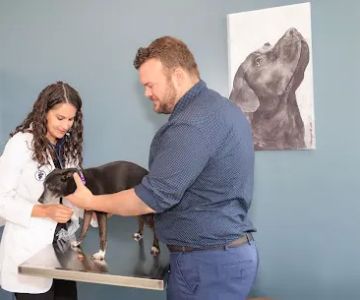Can You Become a Veterinarian After Being a Vet Tech? Your Path to Veterinary Medicine
As a veterinary technician, I’ve always been passionate about animals and providing them with the best care possible. However, after spending several years in the field, I began to wonder about the next step in my career. Could I become a veterinarian after being a vet tech? Would my experience help or hinder my path to becoming a doctor of veterinary medicine (DVM)? These questions are common among veterinary technicians, and the answer is yes – you can absolutely become a veterinarian after working as a vet tech. In fact, many veterinary technicians make the transition to becoming a veterinarian, and their experience can be incredibly valuable throughout the process.
In this article, I’ll share my personal insights and provide a step-by-step guide on how to transition from being a veterinary technician to a full-fledged veterinarian. Whether you’re already working as a vet tech or just considering this career change, this guide will give you the clarity you need to pursue your dream of becoming a veterinarian.
1. Leveraging Your Experience as a Vet Tech
As someone who has spent years working as a veterinary technician, I can confidently say that this experience provides a solid foundation for becoming a veterinarian. Being a vet tech gives you invaluable hands-on experience with animals, which is essential in the veterinary field. You’re already familiar with the day-to-day responsibilities of caring for animals, assisting in surgeries, administering medications, and even providing client education.
This practical knowledge can give you a distinct advantage when applying to veterinary school. While your role as a vet tech is different from that of a veterinarian, many of the skills you’ve developed, such as animal handling, medical terminology, and diagnostic procedures, are directly applicable to your future studies and practice as a veterinarian. Your understanding of animal anatomy and behavior, as well as your experience in various veterinary settings, can make the transition smoother and enrich your educational experience in veterinary school.

131 W State Rd 434, Winter Springs, FL 32708, USA
See Details2. Educational Requirements: What You Need to Become a Veterinarian
One of the biggest differences between being a veterinary technician and a veterinarian is the level of education required. While vet techs typically have an associate’s degree and may work under the supervision of a veterinarian, becoming a veterinarian requires a doctoral-level education. This involves completing a bachelor’s degree, followed by four years of veterinary school to earn your Doctor of Veterinary Medicine (DVM) degree.
When I was considering the transition from a vet tech to a veterinarian, I quickly realized that I would need to go back to school to meet these educational requirements. It’s important to note that the first step is usually earning a bachelor’s degree. While a specific major is not required, it’s highly recommended to focus on pre-veterinary courses, such as biology, chemistry, physics, and animal science. These courses are the building blocks of veterinary school, and having a solid understanding of them will make your transition easier.
3. Admission to Veterinary School
Getting into veterinary school is a competitive process. As someone already working as a vet tech, I found that my experience in the field played a significant role in my application. Many veterinary schools look for candidates with strong academic records, but they also value real-world experience in the veterinary field. Your background as a vet tech can help differentiate you from other applicants and may increase your chances of being accepted into a veterinary program.
In addition to your academic qualifications and experience, veterinary schools also consider your passion for animal care, your communication skills, and your commitment to the profession. I spent a lot of time volunteering at animal shelters, shadowing veterinarians, and participating in research projects to strengthen my application. These experiences not only helped me gain more knowledge about veterinary medicine but also demonstrated my dedication to advancing in the field.
4. The Cost and Time Commitment of Becoming a Veterinarian
While the rewards of becoming a veterinarian are great, it’s important to consider the time and financial commitment involved. Veterinary school typically takes four years to complete, following your undergraduate education. This means that the path to becoming a veterinarian can take eight or more years in total, depending on your individual educational timeline.
Additionally, veterinary school is an expensive undertaking. Tuition costs can range from $20,000 to $50,000 per year, depending on the school and whether it’s a public or private institution. While there are scholarships and financial aid options available, it’s important to be prepared for the financial aspect of veterinary education. Many veterinarians choose to take out loans to cover the cost of their education, but it’s essential to weigh these costs against your expected income as a veterinarian, which, on average, is around $100,000 annually.
5. Career Opportunities After Becoming a Veterinarian
As a veterinarian, you will have a wide range of career opportunities available to you. Veterinary medicine offers several different specialties, including surgery, dermatology, internal medicine, and oncology, just to name a few. Depending on your interests, you may choose to specialize in one of these fields or continue working as a general practitioner. Having experience as a vet tech can also help you decide which area of veterinary medicine is right for you.
Throughout my time as a vet tech, I found myself particularly drawn to surgery and emergency care, and now as a veterinarian, I am able to pursue these interests further. The diversity in veterinary medicine means that there are plenty of opportunities to continue learning and growing in the field, whether that means becoming a specialist or taking on leadership roles in animal hospitals or clinics.
6. Support and Resources During Your Transition
One of the things that helped me the most during my transition from a vet tech to a veterinarian was the support I received from my colleagues and mentors. Many veterinary schools offer mentorship programs, where you can connect with experienced veterinarians who can guide you through the application process and your studies. I also joined professional organizations, such as the American Veterinary Medical Association (AVMA), which provided me with valuable networking opportunities and resources throughout my education.
As you embark on the journey from a vet tech to a veterinarian, it’s important to surround yourself with a support system of people who understand the challenges you will face and are willing to help you succeed. Whether it’s a supportive professor, a fellow veterinary technician, or a family member, having the right people in your corner can make all the difference.
7. Can You Do It? The Path from Vet Tech to Veterinarian
The path from veterinary technician to veterinarian is not easy, but it is absolutely achievable with dedication, hard work, and the right support. Your experience as a vet tech provides you with a unique perspective that can enhance your veterinary education and make you a better doctor in the long run. I’ve found that my background in veterinary technology has been invaluable throughout my career as a veterinarian, and I wouldn’t trade it for anything.
If you’re passionate about animal care and want to take your career to the next level, becoming a veterinarian after being a vet tech is a rewarding and achievable goal. With the right mindset, educational commitment, and support, you can make the transition smoothly and enjoy a fulfilling career in veterinary medicine.










